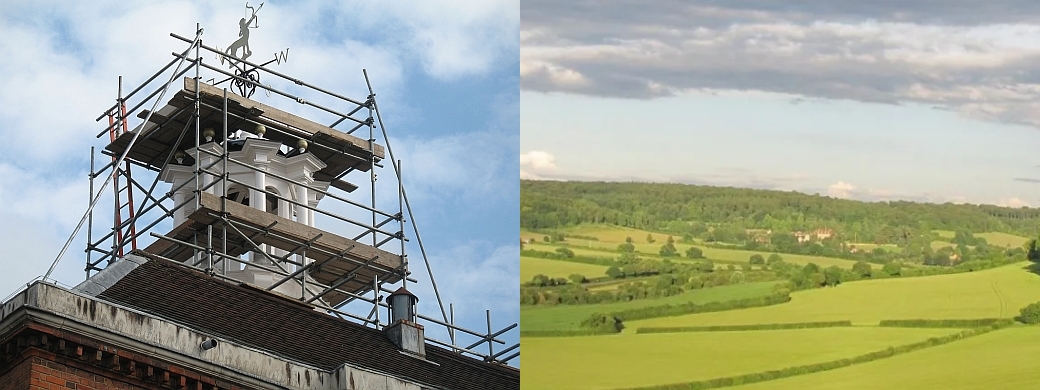The photos alongside were taken on a walk in Flackwell Heath
I confess to a constant need: to have a sense of mission. I don’t suppose this makes me any different from any other man—I specifically mean man as opposed to woman, child or any other specimen from the imaginative catalogue of God’s creatures. I might feel different from everyone else in some ways, but in other males I do recognise myself, at any rate in literature and film: for example in Fight Club, Have you seen it? Edward Norton’s character, the nameless narrator, was in certain ways the embodiment of something in me … this line of thought isn’t going where I had intended, but that’s good, if you believe that structure should be lightened with spontaneity.
I was going to talk about my walk among the municipal allotments, broad vistas, wildflowers and wheat-harvest fields, whilst I flourished in the approving sunlight of my new sense of mission, defined specially for the purpose:
mission: a worthy project with substantial challenge and duration, something to believe in, which I feel called to do, as if by some mysterious impulse.
The very consciousness of it made everything fall into place, and the good thing was it wouldn’t entail any bloody nose or teeth knocked out, so far as I could see.
My wayfaring expedition itself seemed metaphorical but then, when you’re fired up to a mission, everything seems meaningful. That’s why missionaries become missionaries. For example I followed a signpost down a side road, even though I suspected some vandalistic youth had climbed up the pole to point the sign in the wrong direction. It turned out to be a dead end, just gates and a big house behind. But there was an iron guard-dog outside. I could remember the dog from a previous ramble, but I could not remember going down any wrong turning. The mystery remains, & I still don’t know whether to trust signposts.
The allotments were abundant with growth, yet neat: a pretty good collaboration of man with nature. The same applied outside that fenced area, but in a less intensive way, as the whole landscape had been managed by farmers for hundreds, perhaps thousands of years, producing a no less harmonious result, on a larger scale.
I went down the hill to the harvest-fields below, sure-footed and confident in my new intent. The wide vistas competed for my attention with the tiny details at my feet. I can concentrate with fierce intensity, like a guard-dog with its teeth into an intruder’s leg; but it’s my nature also to scan the wide horizons and be distracted by every moving leaf or shard of glass that glints in the sun.
This, to me is wayfaring: to wander alone in the world, loving it with a profound sense of belonging, as if to say “All this too is my home.”*
The other day I watched the two Murdochs, father and son, responding to their summons before a Parliamentary Select Committee, to answer to accusations of irregularities in the newspapers they own. One of the questioners used a wonderful phrase, “wilful blindness”. You can picture Admiral Lord Nelson applying a telescope to his blind eye: “I see no ships”. Ah yes, but we are all taught wilful blindness from a young age. It puts a stop to all those interminable “Why?” questions, for we learn that somewhere in the series, the answers stop. The questions remain, hanging silently in the air: but wilful blindness helps us not to see them any more.
We need that blindness the same way that we need clothes in a cold climate: for health and comfort. There are things that most of the time we cannot afford to see. But sometimes the Muse leads me by the hand and shows me things. And tells me that what I have called “wilful blindness”, others call “being reasonable”. Disputatious as ever, I question the reasonableness of reasonableness.
We make ourselves blind to the fact that our lives are not actually ruled by reason. They are ruled by pursuing whatever makes us feel all right. We then apply reason to tell ourselves that what makes us feel all right is “the truth”.
* Perhaps as described by W H Davies in The Autobiography of a Supertramp; “perhaps” because I’ve never read it, only a poem by him I read at school aged eight, the one which begins, “What is this life, if full of care / We have no time to stand and stare.” The book is available free here.















Don't mistake “being reasonable” for its evil twin “rationalizing”
Rationalizing is an alcoholic telling themselves that one little drink won't hurt. Being reasonable is an alcoholic reminding themselves that the trouble starts with that first drink. If all reasoning is rationalizing, then we're all in serious trouble.
True, it comes down to what you want out of life, but there's something to be said for keeping a level head. No gets very far by lying to themselves. Well, I'm sure some people do, but I wouldn't recommend it.
I'm always perplexed by this antagonistic attitude people have towards reason, as though it will spoil all your fun, or blind you to some greater truth. It's like the petulant complaint of a child who resents having to deal with reality. Our reason and our emotions don't necessarily have to be in conflict with one another. The conflict comes when we resent reason for keeping our impulses in check, reminding us of the consequences. But there's another side to that. Reason can keep us sober minded, focused on our larger goals and what we need to do to achieve them.
LikeLike
I’m so grateful for this I could hug you dear Bryan if it weren’t for the thousand miles of separation. For you have nudged me in the direction of my half-declared mission (announced but not yet set forth), which is to open a crack in our sober-mindedness, to drench our neurons in a dose of philosophical LSD, whence the doors of perception will be cleansed and we will see our even larger goals, the ones which will achieve themselves if we take a break from doing. Which sounds like a mystical programme of not-doing & West-Coast cool from the Beat era. But no, I want to go beyond that too.
In short, I have been meaning to announce that the Mission, as hinted, won’t fit in the blog format at all. I meant to write a Dear John letter, where Dear John includes Dear Bryan & other readers, to excuse myself from the fun of the party, in order to go and be a hermit, so to speak, and put together a writing project, which will be a genuine exploration and report of the greater truth you refer to, which indeed may be the place that a petulant child tries to reach but an adult has long ago abandoned.
It's all been tried before, in Fight Club, in the novels of Jack Kerouac, the poems of Allen Ginsberg, Rimbaud, Baudelaire, the poems and prose of Fernando Pessoa, even the short tales of the Encyclopedist of Counted Sheep. (I love your latest, haven't had time to leave visiting card yet.)
The thousand words of the main post was about thirty times too short to say what I wanted to say—so adding a few hundreds more in comments certainly won’t do it. I shall have to give this up, make “A Wayfarer’s Notes” into just that—notes—& leave myself time for the magnum opus. Which at present is floundering, unable to even find its own language.
LikeLike
Forgive me, Bryan. My last comment didn’t respond adequately to yours.
Yes, rationalizing is an alcoholic telling themselves that one little drink won’t hurt. I accept that, and that it’s different from being reasonable when the alcoholic reminds themself of the trouble that starts with that first drink. So rationalizing and being reasonable are different.
So let me be that child who endlessly asks “why?” “What’s alcoholism, Mommy?” “It’s an unquenchable thirst for alcohol.” “Why?” “It’s a medical condition.” “What does that mean?”
I think of the alcoholic as the petulant child who says, “there must be more to life than this” and then—to cut a long story short—eventually “what the hell! I get no answers. It might as well kill me.”
You can give a sober answer to that petulant child, but I don’t know if it will do any good.
This too is not an adequate comment in response to yours.
We seek the glimpse of paradise, but at best we get a glimpse of paradox.
LikeLike
Sounds like quite an ambitious project. I'm not sure I completely catch your drift, but I am intrigued.
And it's also interesting that you bring up the child asking “Why?” endlessly. I pursued a similar line of thought, if you recall:
'My questioning had led me to that old conundrum that anyone who's ever had a conversation with a four year old child is familiar with. For every “why?” there's another “why?” waiting on deck right behind it. You can explain to the Nth degree how everything in the universe works, from the tiniest microbe to the collision of galaxies, but you'll never reach an ultimate explanation of why it just conveniently happens to be that way. You can take the whole cosmic clock apart piece by piece and show exactly how it keeps time, but you still wouldn't be able explain why we're fortunate enough that this clock even exists instead of just a pile of cogs and gears. In other words, how do you account for the principle of clockworkness itself? Why not chaos? Again, you could go deep, really dig down into the metaphysical foundation of everything and explain why the universe is governed by a system of consistent scientific laws, but you'll find another “why?” waiting right behind that one.'
This led me to the possibility of God's existence. Heaven only knows where it will lead you, but good luck. (You'll need it.)
LikeLike
Wow. When you two get together it's sometimes a little overpowering. After reading some of the back and forth I find myself feeling like the kid asking “But…. why?”
I was just going to jump in here and note that I often use both “willful blindness” combined with a smidgeon of “willful deafness” at work to my great advantage. “Hm? I don't know. If he wanted something I didn't hear it.”
I take it that you are saying you are going to be putting blogging on the back burner to finish your writing project. And other things, as in nature and your very own subconscious, got in the way of that announcement.
Well, as Kerouac would most undoubtedly say “Go man, Go!”
We'll still be here when you come back.
LikeLike
I'm not planning to leave, guys. Your company is too beguiling. But I want to make these posts quick to write and subsidiary to The Mission.
That you don't quite catch my drift lends support to my decision to try a different medium, the old-fashioned one which spreads itself, allows itself more words. I'm experimenting with series of Twitter-length notes, which I privately imagine as “storyboards” for my book. Perhaps they will be hideously boring. I hope you will still be here, though.
LikeLike
I fully intend to be here…
LikeLike
Vincent, I can feel the adrenaline in your post—or maybe it’s just me reacting. You are a Wayfarer indeed.
I feel a little confused about your project. More time tweeting, less time blogging?
Enjoyed the presentation of your photos.
p.s. “It was crap before, to be honest.” Honesty is good, but see how you speak to yourself!
Good luck with your project. It sounds intriguing.
LikeLike
I request that you post a post that is only about your project.
LikeLike
John, I could read this two ways. One way tells me that you saw this post as having two topics, one about my project and one some spurious waffle about a walk on Flackwell Heath; and that you would like me to cut out the latter.
The other way of reading your comment is that you would like to see a post dedicated to the project referred to. Let me ask you straight: would you like to be more intimately involved with the project?
LikeLike
Rebb: ah, the adrenaline! Now that's a substance which only occurs in the here and now. So if you feel it, that's within you.
Yes, I speak to myself very critically sometimes, but it's ion relation to what I produce, not to myself. The first rule of being an artist is that you are completely distinct from your art.
As for your other question, no. I did play with something like tweeting, not on Twitter, though. I think the answer is to maintain this blog whilst subtracting the more wide-ranging philosophical issues to some other medium
LikeLike
Gentleeye, bless you for this. I feel lifted up by those few words!
LikeLike
Vincent,
I would like to know more about the project. I am not sure about the intimacy. I mean, the project and I just met and all.
You make me blush.
LikeLike
If I’m honest the bit about the country stroll was not my favourite.
I’ve not seen Fight Club (metaphorical or not – there’s only so much gore I can handle) but what you’ve written here about it is some of your best. There was fire in it, and a tone of voice I’ve not seen here before – something freer – less ‘correct’. I was disappointed when it changed back to the more usual pastoral.
“Go man, Go!”
Bryan – rationalising vs reasoning – I couldn’t have said it better myself.
“our lives are not actually ruled by reason. They are ruled by pursuing whatever makes us feel all right”
Mostly that’s true, and unavoidable, and much of the fun, but reasoning is a useful tool.
But I won’t have you slag off pottering in the garden! It’s exactly who I am now and I won’t be derided. After a life time banging my head on The World – going Why? Why? Why? (or rather, Why not? Why not? Why not?) pursuing My Mission (to be a field ecologist – no less laudable for having ultimately failed – I did my best) I’ve moved on to something else – growing plants. And it’s a great relief I can tell you.
I don’t know about you but I can imagine the situation would be reversed for someone who felt they had spent their life doing what was expected (job, mortgage, kids etc) and then in middle age decided it was now or never, but that’s not my story.
I would certainly like to hear more of this mission of yours.
LikeLike
Steve, you're right about the stroll. It was a bit contrived to go with the photos.
As for the impromptu film review, I'm glad you like it. Now I wish I'd done one of Lock, Stock & Two Smoking Barrels too: a comedy by Guy Ritchie about rival criminal gangs in which few characters are left alive at the end. It has a dual distinction, in that the entire cast play criminal roles: not only that, but we are assured that they mostly are, or at least were, criminals in real life.
I've missed that opportunity but the next one I have to watch is “Snatch”, also directed by Guy Ritchie.
LikeLike
My remark about retiring and pottering in the garden was really about old age and passing the time, at a stage I'm entering in on now, where it's easy to see everything I do as a trivial pastime, when what I need is a mission I can commit myself too. Steve, have you heard of Alan Bloom who cultivated some acres in Diss, Norfolk, growing perennials? I read a book of his once and wrote to him for a job as apprentice. He wrote a very kind letter back. That was in 1972. I had dropped out after like you banging my head on the world – into a hippy commune, where the lack of mission bugged me so badly, I joined a guru cult.
Actually when I spoke of a Mission in the above post, it was with a certain self-mocking intent. It's not something to be too serious about.
LikeLike
I saw Lock Stock. I liked the bit where the girl emerges out of the upholstery. My preference tends to be for the Coen Brothers’ oeuvre but I haven’t got up the nerve to see No Country For Old Men yet which I believe is pretty harrowing.
But that seems a bit sad – the ‘trivial pastime’ part of life. I hope the ‘self-mocking’ is only half intended. I don’t ever want to get to the stage where everything I do seems futile or trivial. I suppose it depends how worthwhile the rest of your life seems – whether you feel you can justifiably rest on your laurels (or in the Viburnum in my case). I don’t know. I’m hoping the writing will keep me going when even the garden ultimately gets too much, but who knows.
LikeLike